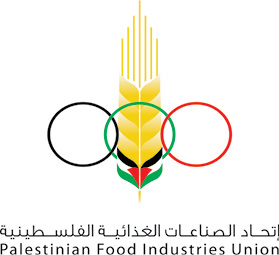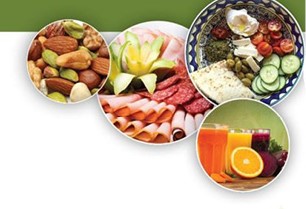
As families spend a considerable amount of money on food – 36 to 38 percent of their income, according to market studies – it is no surprise that they expect high quality products. To meet consumer demands while also supporting the workers in the food industry, the Palestinian Food Industries Union (PFIU) was founded in 1995 as a nonprofit organization. It represents 300 food company members from West Bank and Gaza and 18,000 workers, who represent 20 percent of the official workforce, and an investment of more than US$580 million. (In addition, a large segment of agricultural workers, many of them women, work in the informal economy.) PFIU pursues four main goals. It conducts activities to promote and improve the quality of locally made products according to modern production standards and specifications; it offers help in improving management and marketing skills; it represents the industry in the drafting of policies and regulations, and is a member in all official governmental and nongovernmental committees related to food and agriculture industries; and it provides assistance to company members in accessing export markets.

Food producers in Palestine must ensure that their products meet the highest standards in order to attract new customers and keep loyal ones. The PFIU aims to ensure such quality through a multistep process. First, it helps develop a culture of food quality and safety in the sector. This is achieved through implementing measures to upgrade the Palestinian food sector in order to meet the increasing needs of Palestinian consumers, build a competitive food industry, and provide expertise, training, and technical assistance to members. As workers need adequate tools to create high-quality goods, the union utilizes its local and international connections with other unions and companies to provide access to machinery and training programs. Such connections exist with the Arab Federation for Food Industries and the Federation of Food and Agricultural Industries associated with the Organization of Islamic Cooperation, UNIDO, etc. Importantly, the PFIU continues to support companies through regular inspections and evaluation to guarantee the safe and efficient functioning of assembly lines.
The PFIU oversees eleven food subsectors that form the Palestinian food industry. The top-ranking subsectors include baked-goods manufacturers (1,498 factories), drink producers (51 factories), and dairy companies (45 factories), which together employ a total of 8,708 workers, in addition to meat processing and olive oil manufacturing.
The PFIU’s expertise is not limited to manual labor, as it has helped countless companies develop structures for the administration of their technical, legal, financial, and human resources. After laying the groundwork for a company and making sure operations run smoothly, the union helps promote the products to attract investors. It seeks to open new markets on the domestic, regional, and international levels and aims to discover and make accessible (as much as possible under restricted conditions) sources of raw materials and modern technology. For example, the Palestinian Food Exhibition was founded in 1995 and continues till today to attract and connect potential stakeholders. Furthermore, once a company successfully secures investment, the union helps to build distinguished relations with stakeholders and create methods of cooperation between various stakeholders from the public and private sectors. The PFIU also publishes scientific and economic periodicals related to the food industry.
The Palestinian Ministry of Agriculture and Economy oversees the entire food industry. It passes legislation that affects the food market, ensuring that the food industry is represented in government policies and planning. The PFIU works as the representative for various food companies and makes sure that new laws and regulations do not harm firms or workers.
Once a company achieves stellar quality and sufficient profits, it may consider selling its products on international markets. Engaging in export is a tough endeavor, but the PFIU helps develop strategies that aid companies and is proud to boast that many Palestinian companies have been met with praise throughout the world for their distinguished products.

In its own words, “The PFIU aims to provide the Palestinian community with healthy foods that have been produced by adhering to the best environmental practices and endeavors to develop quality food industries with a Palestinian flavor.” This vision has guided the union’s engagement over the past 25 years, as it works to enhance food quality in Palestine, help companies market themselves, ensure that any legislation passed furthers the overall market, and take Palestinian companies to the global market. In addition, the union cooperates with a variety of international organizations to create projects and programs to help the food sectors.
Projects carried out by the PFIU include the Palestinian Upgrading and Modernization Program, funded by AFD (France) to help 25 food companies obtain quality certificates and marketing expertise as well as the opportunity to participate in international exhibitions. Five companies from the Gaza Strip received ISO 22000 certification. The 2019 “Geza’ona– Our Food” 2019 exhibition was held with the participation of 60 companies from the West Bank and 22 companies from Gaza.
The COVID-19 pandemic’s effect on the food industry in the West Bank and Gaza Strip has been extensive. Thus, in April 2020, the PFIU published a report examining the effects of COVID-19 on food production in the Gaza Strip and the West Bank. In Gaza, 14 of 51 companies closed, and 841 workers lost their jobs, whereas in the West Bank, 2,154 employees began to work in shifts to prevent the loss of 85 different companies as a result of the pandemic and the associated safety rules that mandated fewer workers on production lines. Lower incomes and decreased consumption, as well as a 40 percent decrease in marketing, meant that companies have struggled with reduced revenues and operating funds for production. In addition, many companies did not have enough raw materials in storage and were unable to receive them from suppliers due to closures. As a result, the production capacity of the overall industry has dropped by 48 percent. Dairy companies were particularly affected, experiencing a decrease in the purchase of their products.

Specific industries benefited from the pandemic, however. Pasta manufacturers, for example, saw an increase in sales due to the product’s long shelf life.
To help firms recover financially, the PFIU is working to reduce food imports, especially the import of products that are similar to those manufactured in Palestine. Priority is given to local food products, which are being distributed to poor families. Projects have been created to provide financial support, including loans, as well as to provide sanitization and protection equipment such as masks and PPE. Efforts are also being directed to persuade the Ministry of Finance to decrease the taxes on food producers.


